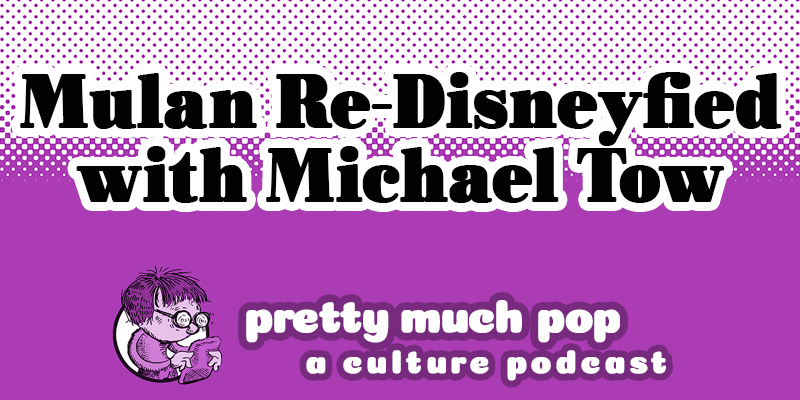
Is the new Mulan the equivalent for Asian-Americans what Black Panther was for African-Americans? The largest entertainment machine we have featured an all-Asian cast telling a traditional Chinese story aimed at the widest possible audience. Did it work?
Actor Michael Tow joins your hosts Erica Spyres, Mark Linsenmayer, and Brian Hirt to discuss the development, aesthetics, and political controversies surrounding the film. The vision of feminism changed between the original poem from ca. 550 C.E. ("When the two rabbits run side by side, how can you tell the female from the male?") to the present, and the "just be you" ethic (with your magical chi!) is not the norm for China in any period. Was the project in its very conception doomed to fall short of some of its goals? Was the live-action an improvement over the 1998 animated version?
Read the poem, and watch a reading of the illustrated 1998 Robert San Souci book Fa Mulan that the films were based on. There have been many adaptations of the story in China.
Other sources we read to prepare included:
- "Inside Disney's Bold $200M Gamble on 'Mulan': 'The Stakes Couldn't Be Higher'" by Rebecca Ford
- "How Disney’s ‘Mulan’ Became One of 2020’s Most Controversial Movies" by Alice Su
- "Disney Wanted to Make a Splash in China With ‘Mulan.’ It Stumbled Instead" by Brooks Barnes and Amy Qin
- "Why Chinese viewers hate Disney’s ‘Mulan’" by Dennis E. Yi
- "A Chinse-American Actor's Reaction to Disney's Biggest Flop" by Victor Zheng
- "Review: ‘Mulan’ is Uncritical of China—and Unmemorable" by Kevin Christopher Robles
- "Mulan: A Flawless Feminist Fable That Stands the Test of Time (Review)" by Zach Gilbert (about the animated film)
Follow Michael on Twitter @michaelctow and check out his imdb credits. Michael hosted a Q&A with the Mulan cast shortly after the film's release.
Learn more at prettymuchpop.com. This episode includes bonus discussion that you can only hear by supporting the podcast at patreon.com/prettymuchpop. This podcast is part of the Partially Examined Life podcast network.
Pretty Much Pop: A Culture Podcast is the first podcast curated by Open Culture. Browse all Pretty Much Pop posts
Mulan Re-Disneyfied: A Pretty Much Pop Culture Podcast (#62) Discussion with Actor Michael Tow is a post from: Open Culture. Follow us on Facebook, Twitter, and Google Plus, or get our Daily Email. And don't miss our big collections of Free Online Courses, Free Online Movies, Free eBooks, Free Audio Books, Free Foreign Language Lessons, and MOOCs.
from Open Culture https://ift.tt/345swHC
via Ilumina
Comments
Post a Comment